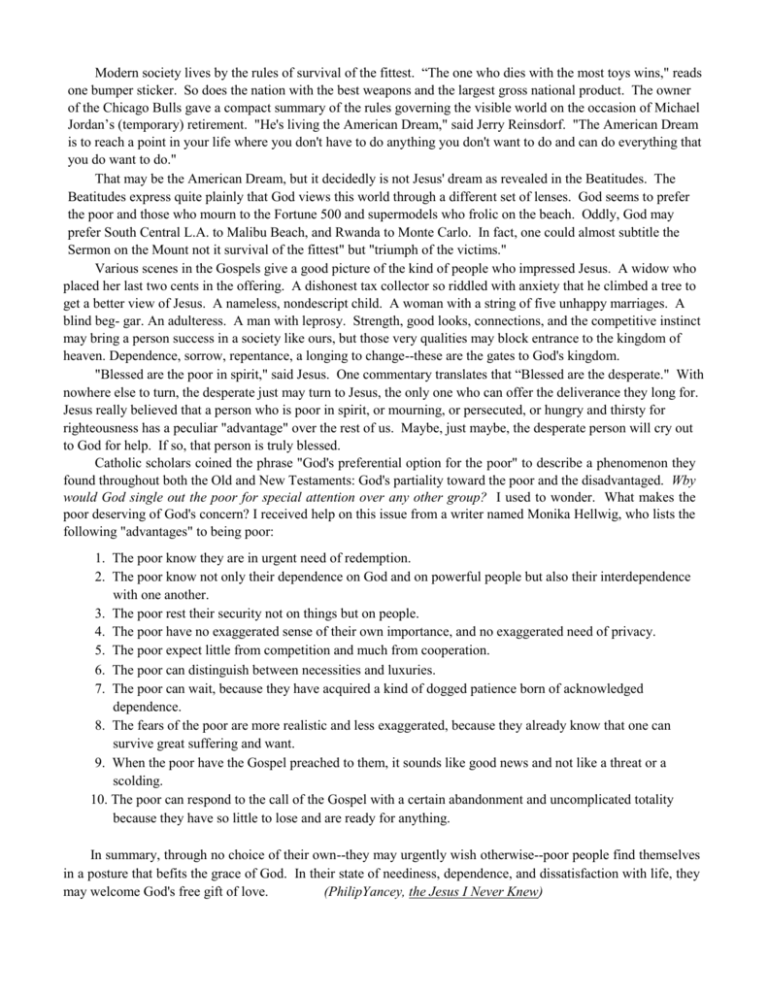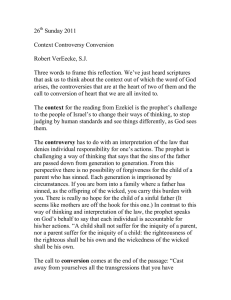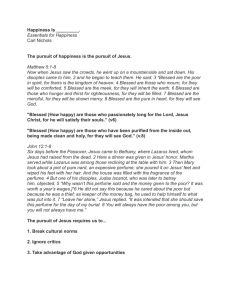Modern society lives by the rules of survival of the fittest
advertisement

Modern society lives by the rules of survival of the fittest. “The one who dies with the most toys wins," reads one bumper sticker. So does the nation with the best weapons and the largest gross national product. The owner of the Chicago Bulls gave a compact summary of the rules governing the visible world on the occasion of Michael Jordan’s (temporary) retirement. "He's living the American Dream," said Jerry Reinsdorf. "The American Dream is to reach a point in your life where you don't have to do anything you don't want to do and can do everything that you do want to do." That may be the American Dream, but it decidedly is not Jesus' dream as revealed in the Beatitudes. The Beatitudes express quite plainly that God views this world through a different set of lenses. God seems to prefer the poor and those who mourn to the Fortune 500 and supermodels who frolic on the beach. Oddly, God may prefer South Central L.A. to Malibu Beach, and Rwanda to Monte Carlo. In fact, one could almost subtitle the Sermon on the Mount not it survival of the fittest" but "triumph of the victims." Various scenes in the Gospels give a good picture of the kind of people who impressed Jesus. A widow who placed her last two cents in the offering. A dishonest tax collector so riddled with anxiety that he climbed a tree to get a better view of Jesus. A nameless, nondescript child. A woman with a string of five unhappy marriages. A blind beg- gar. An adulteress. A man with leprosy. Strength, good looks, connections, and the competitive instinct may bring a person success in a society like ours, but those very qualities may block entrance to the kingdom of heaven. Dependence, sorrow, repentance, a longing to change--these are the gates to God's kingdom. "Blessed are the poor in spirit," said Jesus. One commentary translates that “Blessed are the desperate." With nowhere else to turn, the desperate just may turn to Jesus, the only one who can offer the deliverance they long for. Jesus really believed that a person who is poor in spirit, or mourning, or persecuted, or hungry and thirsty for righteousness has a peculiar "advantage" over the rest of us. Maybe, just maybe, the desperate person will cry out to God for help. If so, that person is truly blessed. Catholic scholars coined the phrase "God's preferential option for the poor" to describe a phenomenon they found throughout both the Old and New Testaments: God's partiality toward the poor and the disadvantaged. Wby would God single out the poor for special attention over any other group? I used to wonder. What makes the poor deserving of God's concern? I received help on this issue from a writer named Monika Hellwig, who lists the following "advantages" to being poor: 1. The poor know they are in urgent need of redemption. 2. The poor know not only their dependence on God and on powerful people but also their interdependence with one another. 3. The poor rest their security not on things but on people. 4. The poor have no exaggerated sense of their own importance, and no exaggerated need of privacy. 5. The poor expect little from competition and much from cooperation. 6. The poor can distinguish between necessities and luxuries. 7. The poor can wait, because they have acquired a kind of dogged patience born of acknowledged dependence. 8. The fears of the poor are more realistic and less exaggerated, because they already know that one can survive great suffering and want. 9. When the poor have the Gospel preached to them, it sounds like good news and not like a threat or a scolding. 10. The poor can respond to the call of the Gospel with a certain abandonment and uncomplicated totality because they have so little to lose and are ready for anything. In summary, through no choice of their own--they may urgently wish otherwise--poor people find themselves in a posture that befits the grace of God. In their state of neediness, dependence, and dissatisfaction with life, they may welcome God's free gift of love. (PhilipYancey, the Jesus I Never Knew)











